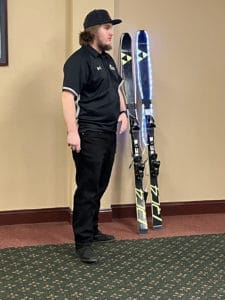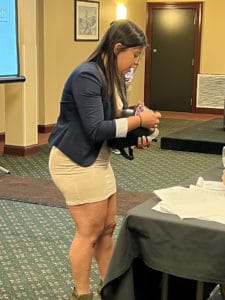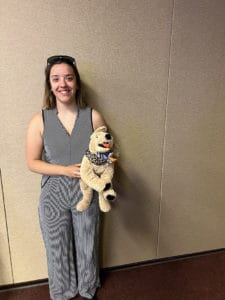By Katy Savage
Castleton University students at the School of Resort Management spent 10 weeks developing a product and a business plan to ask for an investment offer.
The 12-week course is modeled after the reality television program, “Shark Tank.” It teaches students how to write a business plan that is solid enough “to be able to walk into a bank … and hopefully get a loan,” said Chris Coughlin, who teaches the course.

Castleton University students showed off their prototypes at the Killington Grand Hotel on May 24. , Joshua David shows off skis that light up in the dark.
“It’s very exciting when the business plan and the prototypes are seen together,” he said.
Coughlin used to work for Heritage Family Credit Union and he has 18 years of experience working in finance at Killington Resort.
The products the students designed had to be unique.
“I coach them on what I think will fly,” Coughlin said. “I don’t want to see them crash and burn so I try to help them.”
Coughlin leaves it to the panelists to decide the winner and the winning team gets an automatic “A” in the class.
“Regardless of how great the presentation is and how smart the students are, it comes down to whether or not the panelists think the product could sell in the marketplace,” Coughlin said.
Students presented their projects on Tuesday, May 24 at the Killington Grand Hotel. Panelists included Rich McCoy, the general manager of Pico Ski Resort; Dale Patterson, the owner and operator of Rutland Beer Works and the Hoppin’ Moose restaurant; Russ Marsan, the owner and operator of Carpenter and Costin Commercial and Residential Landscaping and senior loan officers.
Projects included skis with LED lights for night riding, a portable car tray that heats up to keep food warm, a device that uses low-frequency sounds to keep bears away, a stuffed animal with a hidden camera inside to watch over pets and a retractable studded safety boot.
The panelists questioned students about their financials, their employee wages, competing products, distribution, and if the students’ ideas would survive in the marketplace.
Jacob Catori and his partner, Keegan, created a head sock that zips into the backs of jacket collars to keep snow out. They told sharks they projected to make $5 million in five years at a retail price of $49.99.
“Keegan and I are asking for a $200,000 investment that will be paid back over the course of four years,” Catori said. “We are prepared to offer you $300,000 interest for a total payback of $500,000 over four years.”

Sophia Clements shows off her winning design — goggles that flip up.
But the panelists questioned their distribution plan, the quality of the zipper and how consumers would zip the product to their jackets themselves.
“You only have $1,000 for marketing?” one panelist asked.
The winners were Sophia Clements and her partner, Kyle Donahue, for their product, Flip and Swipe Goggles. The goggles flip up so skiers and riders can adjust the lenses and remove snow or fog.
They also have an LED light strip for visibility.
“I was honestly very surprised,” Clements said. “It was very reassuring that I won.”
Clements, 20, has been skiing since she was 4 and grew up ski racing.
“It’s an easy product and nobody has come up with it yet,” she said.
Clements is currently a banquet captain at the Killington Grand Hotel. After she graduates from college next year, she wants to stay in the resort food and beverage industry or become a banquet coordinator, following her parents, who both work in the ski industry.
Clements doesn’t have future plans for her project, but she has an appetite for all things business.
“I’ve had past experiences with professionally competing in business competitions,” she said. “Doing this is something that I’m passionate about.”

A student holds a stuffed animal with a hidden video camera.
Coughlin has been holding the Shark Tank competition for the last six or seven years. Though his students have never taken their products to market, their ideas have. Coughlin said a football that plays music and a bracelet that carries hand sanitizer are now available.
This year, Coughlin expected either the bear tag to win, but some panelists were concerned the noise from the bear tag would aggravate dogs and other pets.
“I get it wrong every year who I think should win,” he said. “That’s where I go to, ‘Would I buy this product?’ I would have bought the bear tag.”




